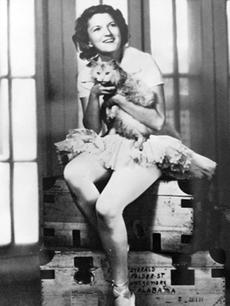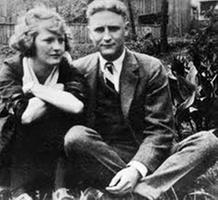
|
|
| photo: Tom Clark | |
Therese Anne Fowler is an Illinois native and a graduate of North Carolina State University, where she earned a BA in sociology and an MFA in creative writing. She taught undergraduate fiction writing and was an editorial assistant for the literary magazine Obsidian III before leaving to write fiction full-time. Fowler has two grown sons and two nearly grown stepsons, and lives with her husband in North Carolina. Visit her on Facebook or at ThereseAnneFowler.com.
What led you to Zelda Sayre as a subject?
I seemed to be at a low point in my writing career. I had been writing contemporary women's fiction, had just finished my fourth novel and didn't love it. I was journaling ideas on my front porch one day and was struck by the question: "Has anyone written about Zelda?" Some have, but she was certainly more than the crazy wife of F.Scott. When I discovered that she died the same date my mother died, it felt like some kind of a sign--I had to dig deeper. So began the process of archeology: if you keep brushing away the nonessential parts, a picture begins to emerge. I read about Scott and Zelda together and separately. Immersed myself in the Princeton Library Collection, which is a treasure trove of well-documented letters to and from Gerald and Sara Murphy, pivotal figures in Scott and Zelda's lives; Max Perkins's (Scott's genius editor) letters to Scott and Scott's to Perkins; Hemingway's letters to Scott and his to Hem.

The book is being showcased as establishing Zelda as an artist in her own right. Was that your intention?
Zelda was a product of all that she had learned and internalized. Being brought up as a wealthy and beautiful Southern belle was hardly the road to making a stand for herself. She didn't know the depth of her interest in the arts--writing, dance and fine art--until she became involved in each of them. She has been badly misrepresented as a person. I wanted to get her story straight; whatever that truth is, that's what I wrote. She was called a "dabbler" by Scott, mostly out of fear that she might outshine him. When I was writing, I kept wishing that I could make her see that she was worthwhile on her own, she could be independent. She had too many forces acting on her: trying to be a supportive wife while recognizing the realities of her situation. She allowed her stories to be published under Scott's name--what a travesty that was. She couldn't believe that anyone would publish her and since she was not a woman of independent means, she let it happen. Besides, it brought more money into the household when Scott had hit a writing--or drinking--wall.
Hemingway and Fitzgerald were good friends when Hemingway suddenly turned against Zelda and told Scott that she was hampering his career, she was crazy, she wasn't supportive, etc. You have neatly finessed that abrupt change in Hemingway's behavior with something that could have happened--but we don't know for sure.
Hemingway was known for turning against people he had been close to. It usually happened when he was denied something he wanted. Zelda told Scott from the beginning that there was "something off" about Hemingway, but Scott couldn't see it. What I wrote as an explanation of Hemingway's change of attitude could well have been the case--or something like it.
There is a strain of mental instability running through Zelda's family. Do you think that this inherited weakness was exacerbated by alcohol and dissatisfaction with her marriage?
It would be hard not to see what was inherent in her. Her brother's psychotic episodes were part of the family weakness, as was her instability, wrongly diagnosed as schizophrenia. What she likely suffered was bipolar disorder but the doctors at the time were more comfortable representing her as very seriously ill and overtreating her. She wouldn't "toe the line" as a wife and mother only, so there must be something terribly wrong with her. She was constantly overdoing, overtraining for dance recitals, then finding herself and her performance wanting and being critical of herself.

It's hard to read the words of that time, the context in which Zelda was supposed to perform as a good and dutiful wife.
She was deeply conflicted about those duties and occasionally lost sight of what was allowable in the day and age. The Southern way was for women to be slaves to their husbands' lives. Zelda overestimated the possibility of being a wife and mother and also a professional dancer. She saw some women able to carve out careers for themselves, but they were often half of a lesbian couple where one partner tended the home fires and the other pursued her art. In Gertrude Stein's salon, women all sat together in a separate room while Gertrude presided over the men and their discussion of their art. She and Scott were looked upon as trend-setters; why not be an artist in addition to being a wife and mother? It didn't work for Zelda, but it was not for lack of trying.
As much as this is Zelda's story, it is also the story of weak, needy men.
Both Scott and Hemingway were certainly needy and Scott's dependence on alcohol to "turn down the light" eventually did him in. The fact that Scott insisted on Zelda's stories being published under his name was only one indication of his insecurity. He also fought her attempts to establish herself as a dancer or an artist.
What's next on your writing agenda?
I am currently doing research on a book of historical fiction, more about a time, the early 1900s, than a person. It is in its nascent stages at the moment. --Valerie Ryan, Cannon Beach Book Company, Ore.

